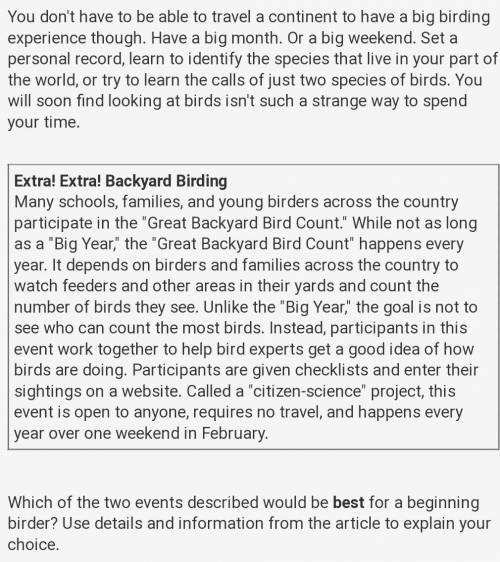
English, 06.08.2021 04:40 dndndndnxmnc
A Big Year By Bob Kowalski Would you go to the ends of the earth to see a bird? What if it were a really special bird: one with beautiful feathers, an entrancing call, or a silly dance? What if seeing that one special bird would allow you to win a contest? If that contest doesn't get you on television or win you any cash prizes, would you still do it? For those who participate in the "Big Year," the honor of beating the previous record is the only reward they get or even want. A "Big Year" is a year in which a person attempts to see as many different species of birds as possible within a particular region. For most in North America who participate in a "Big Year," this region is the lower 48 American states, plus Alaska, Canada, and a couple of French islands off the Canadian coast. You may be thinking that looking at birds is silly, but just think about the numbers of the recent record holders and the commitment it takes to get these numbers. One recent "Big Year" winner managed to see 744 birds in one year, missing the record by just one bird. Big Year birders travel by train, plane, boat, car, bicycle, and of course, by foot. They can cover over 150 thousand miles to get numbers of sightings this high. They can also spend a small fortune. Just to clarify, the birds these contestants are counting are the number that they see in a particular year. You see, the contest is based on an honor system. No pictures or other evidence is required as proof of a sighting. Most birders take great pride in their reputation and their abilities to see or hear and then identify a bird. Usually, important sightings of the rare birds needed to get counts in the 700s are visited by hundreds of birders. It is pretty hard to cheat your way to a record-breaking year, but in general, few are interested in cheating. This honesty comes from the fact that most people who want to break such a record know the greatest rewards are not necessarily in winning. Such rewards are in being able to commit a year of your life to doing something you love. Rewards are found in seeing amazing, inspiring creatures like the California Condor or the Magnificent Frigate bird. Rewards also come in spending time with people who, like you, want to spend their time looking to the skies and trees for glimpses of emerald, crimson, or cerulean blue feathered jewels. You don't have to be able to travel a continent to have a big birding experience though. Have a big month. Or a big weekend. Set a personal record, learn to identify the species that live in your part of the world, or try to learn the calls of just two species of birds. You will soon find looking at birds isn't such a strange way to spend your time. Extra! Extra! Backyard Birding Many schools, families, and young birders across the country participate in the "Great Backyard Bird Count." While not as long as a "Big Year," the "Great Backyard Bird Count" happens every year. It depends on birders and families across the country to watch feeders and other areas in their yards and count the number of birds they see. Unlike the "Big Year," the goal is not to see who can count the most birds. Instead, participants in this event work together to help bird experts get a good idea of how birds are doing. Participants are given checklists and enter their sightings on a website. Called a "citizen-science" project, this event is open to anyone, requires no travel, and happens every year over one weekend in February. Which of the two events described would be best for a beginning birder? Use details and information from the article to explain your choice.


Answers: 3


Another question on English

English, 21.06.2019 16:30
"the trouble is," sighed the doctor, grasping her meaning intuitively, "that youth is given up to illusions. it seems to be a provision of nature; a decoy to secure mothers for the race. and nature takes no account of moral consequences, of arbitrary conditions which we create, and which we feel obliged to maintain at any cost." what larger idea is the doctor referring to when he says that nature takes no account of moral consequences? impulses often overrule a person’s sense of good and bad. nature forces women into motherhood. young people are prone to having delusions. morals play no role when we choose who we love.
Answers: 3

English, 22.06.2019 00:30
What is the definition of scathing? a. to assail with abusive language c. to deter by advice or persuasion b. bitterly severe, as a remark d. the west wind; a mild wind
Answers: 2

English, 22.06.2019 08:00
Analysis that compares and contrasts the way two myths show one important feature of their culture
Answers: 3

English, 22.06.2019 09:30
In the play jack and algernon tell lies so that they may further pursue pleasure and avoid obligations. have you ever lied for such a purpose? do you think it is always wrong to lie, or are there circumstances when lying might be okay. what consequences can arise from lying? if you want share an experience where you either told a lie or were lied to and the consequences that happened because of the dishonesty
Answers: 1
You know the right answer?
A Big Year By Bob Kowalski Would you go to the ends of the earth to see a bird? What if it were a re...
Questions


Computers and Technology, 26.11.2021 14:00


Mathematics, 26.11.2021 14:00

Mathematics, 26.11.2021 14:00



Advanced Placement (AP), 26.11.2021 14:00

Mathematics, 26.11.2021 14:00


Mathematics, 26.11.2021 14:00



History, 26.11.2021 14:00

Mathematics, 26.11.2021 14:00



Arts, 26.11.2021 14:00

Biology, 26.11.2021 14:00



